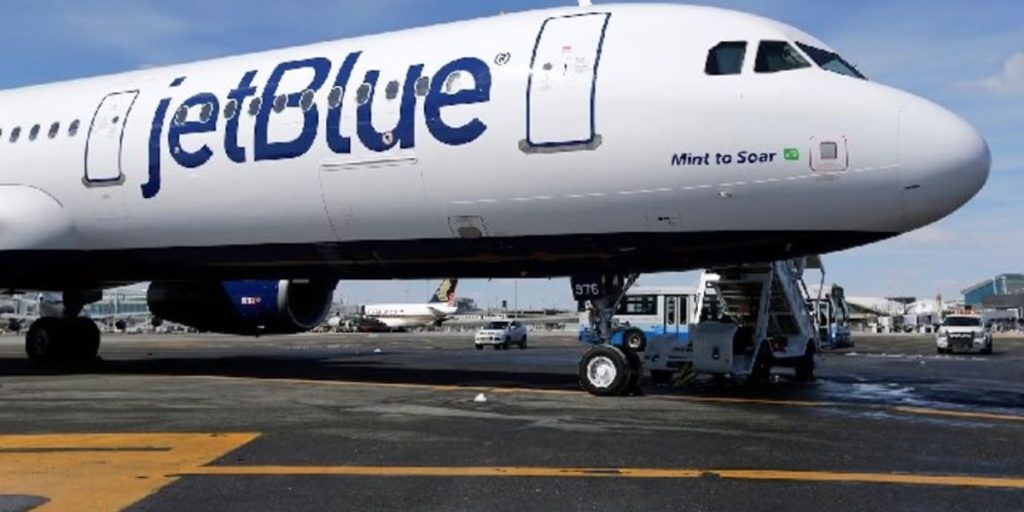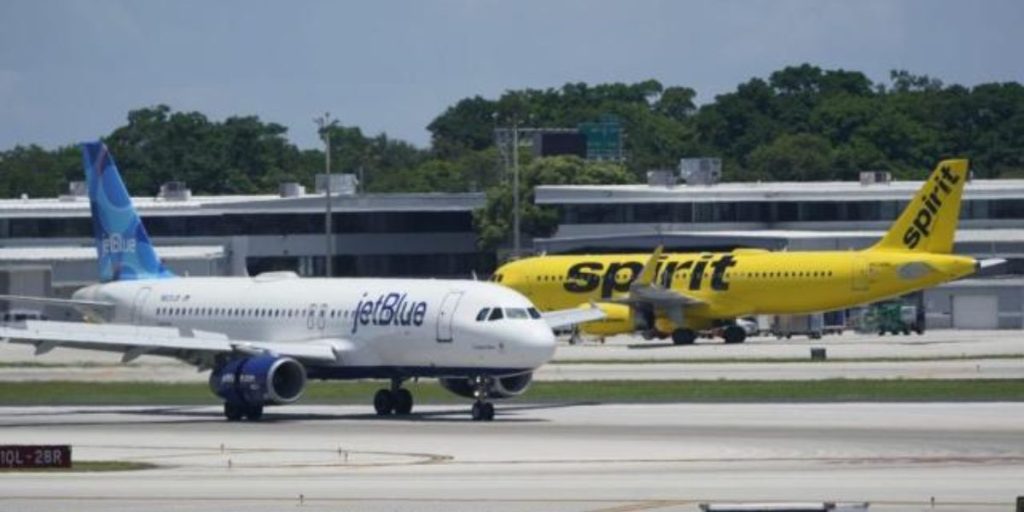A federal judge sided with the Biden administration on Tuesday, blocking JetBlue Airways’ $3.8 billion acquisition of Spirit Airlines, citing concerns that the agreement would restrict competition.
The Justice Department had sought to prevent the merger, claiming it would raise costs by eliminating Spirit, the country’s largest low-cost airline.
U.S. District Judge William Young, who presided over a non-jury trial last year, said Tuesday that the government had demonstrated that the combination “would substantially lessen competition” and violated a century-old antitrust law.
In his decision, which spanned more than 100 pages, the court acknowledged the Justice Department’s claim that Spirit is especially vital to travelers looking for an alternative to more expensive carriers.

“Spirit is a smaller airline. “But there are those who enjoy it,” he wrote. “To those dedicated customers of Spirit, this one’s for you.”
Young stated that a JetBlue-Spirit merger “would likely place stronger competitive pressure on the larger airlines in the country.” At the same time, consumers who rely on Spirit’s distinctive, low-cost strategy will likely suffer.”
Spirit Airlines Inc. shares fell 47% following the judgment, while JetBlue shares rose 5%.
JetBlue and Spirit said they disagreed with the verdict and were considering an appeal.
New York-based JetBlue had maintained that the acquisition would allow it to develop in a single transaction and better compete with larger rivals that dominate the US air travel market.
“We continue to believe that our combination is the best opportunity to increase much-needed competition and choice by bringing low fares and great service to more customers in more markets,” the airline said in a statement.
The verdict was a victory for the Biden administration, which has taken aggressive steps to prevent consolidation in key industries.
“Capitalism without competition isn’t capitalism—it’s exploitation,” President Joe Biden stated on X, formerly known as Twitter. “Today’s verdict is a triumph for all customers who desire lower costs and more alternatives. “My administration will continue to fight to protect consumers and enforce antitrust laws.”
The verdict marked JetBlue’s second big setback in federal court in less than a year. Another judge in the same Boston courthouse struck down JetBlue and American Airlines’ Northeast collaboration.
JetBlue, the country’s sixth-largest airline by revenue, must now devise another expansion strategy. That will be a task for new CEO Joanna Geraghty. Next month, she will succeed Robin Hayes, who arranged both of the acquisitions that have now been stopped in court.
Tuesday’s decision could pave the way for Frontier Airlines to make another bid for Spirit. In 2022, the two budget airlines announced a cash-and-stock merger, but JetBlue made an all-cash offer and won a bidding war for Spirit, situated in Florida.
Spirit’s CEO and board initially resisted a sale to JetBlue, predicting that regulators would try to stop a deal that would wipe a low-cost carrier from the U.S. landscape – JetBlue intended to repaint Spirit’s planes and remove some seats to match JetBlue’s larger interior.
To counter that opposition, JetBlue pledged to pay Spirit a $70 million reverse breakup fee and $400 million to Spirit stockholders if the transaction failed due to government opposition.
According to Helane Becker, an airline analyst for the financial services firm Cowen, Spirit will most likely look for a new buyer, but it will also file for Chapter 11 bankruptcy restructuring.
JetBlue and Spirit have struggled to recover from the pandemic, but their larger competitors have restored to normal profitability. JetBlue has lost more than $2 billion since the beginning of 2020, while Spirit, hampered by increasing prices and lower demand, has lost more than $1.6 billion.

That sparked support for a merger between them, as well as criticism of the judge’s decision.
“Blocking a merger of smaller competitors trying to combine resources and scale up to compete with the top four airlines makes little sense,” said Jessica Melugin, an antitrust specialist at the Competitive Enterprise Institute, which is opposed to government involvement in the market. “It risks making both Spirit and JetBlue less able to compete with the big guys and ultimately leaving the airline industry less competitive, harming consumers.”
However, critics of mergers over the last 15 years, which have eliminated Continental, Northwest, US Airways, AirTran, and Virgin America, hailed the decision.
“This is an enormous victory for travelers, workers, and local communities, as well as another huge win for antitrust enforcers” at the Justice Department, said William McGee, an air-travel expert at the American Economic Liberties Project.
The government’s success may increase the likelihood that it will dispute Alaska Airlines’ bid to buy Hawaiian Airlines for $1 billion and assume approximately $900 million of Hawaiian’s debt.
“The era of relentless accumulation is over. “We hope that judges presiding over future airline mergers, such as Alaska-Hawaiian, will follow Judge Young’s lead,” McGee added.
The government has not announced whether it will sue to prevent Alaska from purchasing Hawaiian. However, the government may have tipped its hand. “The Justice Department will continue to vigorously enforce the nation’s antitrust laws to protect American consumers,” Attorney General Merrick Garland stated.